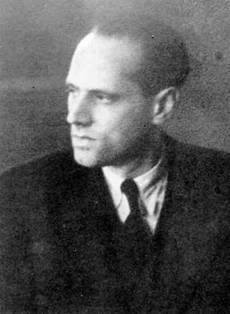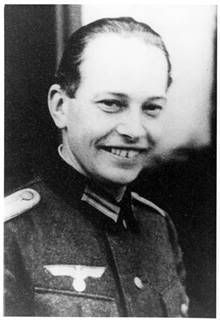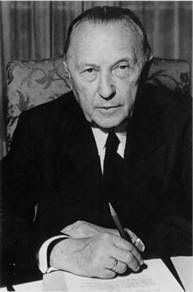

"I can only highlight that the Kreisauer Circle was very oecumenic, Count von Moltke explicitly names the oecumenic component and that the Jesuit General Ledochowsky in a conspirative fashion was called "our General" by the members of the Kreisauer Circle."
Source: http://diskussion.cdu.de/forum/thema4/ileP...s.ovr/ileeCrUgl
From The Un-Hived Mind:
Dear friends,
The plot thickens even more - Is Ledochowskis work still having influence on German politics today?
As I don't have much time right now please excuse that this is just my unfinished theory.
For that reason I'd like the input of all of you to establish if this is worth further persuing.
I might be running in the wrong direction - but if it holds true we are unwillingly on our way crushing Germanys most highlighted resistance movement during WWII.
How did I get this lead? Ok - now this gets odd!
It is about the CDU (Christlich Demokratische Union/Christian Democratic Union) - one of Germany's most influential political parties to this day.
In the official CDU forum someone posted about the inception of the CDU party and it's Jesuit connection.
They are telling us that Ledochowski when he died in 1942 already had a "network" for a new political direction in place. This was headed by his Provincial Augustin Rösch SJ with the help of Count J. von Moltke, the Kreisauer Circle and Pius XII.
In the last weeks of the war out of this emerged structures later to be the CDU.
"I can only highlight that the Kreisauer Circle was very oecumenic, Count von Moltke explicitly names the oecumenic component and that the Jesuit General Ledochowsky in a conspirative fashion was called "our General" by the members of the Kreisauer Circle."
Source: http://diskussion.cdu.de/forum/thema4/ileP...s.ovr/ileeCrUgl
I would have granted them the right to be an opposition with having only been infiltrated at the top by Rösch and maybe 1-2 more people.
But by saying "our General", having a Provincial in the midst and most of them being catholic or even SMOM/SJ they have to know of the influence the church has had in that game. By not telling they are the WWII version of Alex Jones - firing peoples emotions and resistance up while still holding back on truth.
Now who were all those praised fighters of nazi doctrine and how do they fit in our picture of Jesuit/Catholics steering WWII?
Kreisau Circle
"But the circle's main focus was to plan and propose a peacetime government for Germany; they do not ever appear to have made any plans to overthrow the Nazi state."
http://en.wikipedia.org/wiki/Kreisau_Circle
"[T]hey wrote a plan for a constitution that included subjects like economy, foreign policy, justice, religious, culture, education and even the trails against the nazi war criminals."
http://www.geocities.com/Athens/Academy/1148/july6.html
Wasn't this Pope Pius XI encyclical?
"He issued the encyclical Quas Primas establishing the feast of Christ the King, and took as his papal motto "Christ's peace in Christ's kingdom." This indicates the central idea of his pontificate: that the Catholic religion must permeate all areas of human living: the home, the city, politics, economics, art etc. Rather than allowing religious belief to be reduced to a merely private matter, or withdrawing the Church from involvement in the outer world, Pius XI thought Catholics must work to create a truly Catholic society: Christ must be King over every aspect of life."
http://en.wikipedia.org/wiki/Pope_Pius_XI
This is a contingency plan and would explain the Jesuit involvement/interest in all of this.
Fake resistances like today - people will think someone allready acts on it so I don't have to.
A little bit about members of the Kreisauer Circle:
Augustin Rösch, SJ
http://de.wikipedia.org/wiki/Augustin_R%C3%B6sch
http://www.bautz.de/bbkl/r/roesch_a.shtml
Rösch was questioned 1017 times during the nazi reign.
Either there is something to question him for or not. And if you suspect something you don't let him go 1017 times.
I mean over which timespan? 10 years? That would still be every 3rd or 4th day!
Sounds more like a cover to get him to give the new intel - or brief him…
Do you really think if he was a real rebel the Superior General would have let him stay Provincial?
Also why do they grab Delp and hang him if they had that much intel on Rösch?
Following the Jesuit oath Delp was the one of their own who was dispensable.
Alfred DelpAbout Germany's CDU - Christian Democratic Union, from Wikipedia:
http://de.wikipedia.org/wiki/Alfred_Delp
Eric Jon Phelps on page 620 in Vatican Assassins III quotes Hoensbroech and shortly the Jesuit Alfred Delp is mentioned - I had a closer look at him and think Delp was just a patsy to justify what they already had in store - because Delp, like Augustin Bea (who also was admired for what he did to this day) was directly commissioned by Ledochowskis Provincial Augustin Rösch SJ!
This was not only to have a "fake" resistance but it actually seams the Nobility and the Provincial worked hand in hand to create the successor political party for the Superior General.
Helmut James Count von Moltke
http://en.wikipedia.org/wiki/Helmuth_James_Graf_von_Moltke
Look at who runs in his family:
http://en.wikipedia.org/wiki/Helmuth_Karl_...hard_von_Moltke
http://en.wikipedia.org/wiki/Helmuth_von_Moltke_the_Younger
Peter Yorck von Wartenburg
http://en.wikipedia.org/wiki/Peter_Yorck_von_Wartenburg
Wartenburg was born and lived in a castle that was in Templar/Order of Malta hand
http://de.wikipedia.org/wiki/Ole%C5%9Bnica_Ma%C5%82a
Adenauer
"a devout Catholic who had received the Magistral Grand Cross personally from SMOM Grand Master Prince Chigi"
http://www.mega.nu:8080/ampp/naziism.html
Germans first chancellor Konrad Adenauer (SMOM) in 1906 had joined von Papens (SMOM) and Leibers (SJ) Center Party.
His political opponent of the SPD, Carlo Schmid later said: "[He] was the first man of the state to be created, while it still wasn't in existence."
[Udo Kempf, Hans-Georg Merz: Kanzler und Minister 1949–1998. Westdeutscher Verlag, Wiesbaden 2001, S. 82]
Hoensbroech, Fourteen Years a Jesuit., Volume II, page 165, second paragraph:
"Ever since the establishment of the Centre Party in Germany it has always been closely connected with the Jesuit Order. Theologians of the German Province were often consulted by parliamentary members of the Center. The leader of the Centre, Leiber, was a frequent guest in the German Jesuit Colleges on the Dutch frontier (Exaeten, Wynandsrade, Blyenbeck)."
All this would also imply that possibly Scientology Tom Cruse playing Stauffenberg (connected to the Kreisau Circle) is Jesuit propaganda to lead the American people into violent revolution against Bush to further their plan the same way! As seen today at least in the media the pope denies a meeting to Rice. (http://news.bbc.co.uk/2/hi/europe/7002988.stm)
Remember: The von Stauffenberg family is one of the oldest and most distinguished aristocratic Roman Catholic families of southern Germany and had a strong Bamberg connection. Look up Erics VAIII to see the importance of the city of Bamberg.
http://en.wikipedia.org/wiki/Claus_Schenk_von_Stauffenberg
So after the end of the deliberate war not just the people who were in (or got to) power in Germany were roman catholics (SMOM or SJ) they also as we allready know created the new industrial infrastructure, central banking, secret services and now we see they are responsible for the "new" political party system.
Now remember that our Bush and Brown friendly German chancellor Angela Merkel is of the CDU party.
While having a look at this one can come to the conclusion that Germany, as it is since 1945, is an artificial creation for Vatican deeds.
Looking forward to your feedback.
WbR,
Boris
And about its predecessor, the Centre Party, from Wikipedia:History
The party's roots go back to the Centre Party, founded in 1870 to promote the interests of German Catholics. The party played an important role and participated in most national governments from the last years of the German Empire and during the Weimar Republic, but was dissolved in 1933.
CDU was founded after the war with many members of the former Centre Party, but with the goal to include not only Catholics, but also Protestants, in a common confessional and conservative party. Its first leader and West Germany’s first chancellor was Konrad Adenauer. The CDU was the dominant party with Konrad Adenauer as its leader from 1949 to 1963. Then in 1963, Ludwig Erhard of the CDU succeeded Adenauer, preceding a recession in 1966. This caused the CDU to wane in power and consequently form a coalition with the SPD. Kurt Georg Kiesinger (CDU) then took power as chancellor of West Germany.
http://en.wikipedia.org/wiki/Christian-Democratic_Union_of_Germany
The German Centre Party (Deutsche Zentrumspartei or merely Zentrum), often called the Catholic Centre Party, was a Catholic political party in Germany during the Kaiserreich and the Weimar Republic. The party dissolved itself on July 6, 1933, shortly before the conclusion of a Concordat between the Holy See and Germany. After World War II, the party was refounded, but could not rise again to its former importance, as most of its members joined the new Christian Democratic Union (CDU).The Soest programme and the founding of the "Centre Party"
Growing anti-Catholic sentiment and policies, including plans for dissolving all monasteries in Prussia, made it clear that 'group' reorganization was urgently needed in order to protect Catholic minority rights, enshrined in the 1850 constitution, and to bring them over to the emerging nation state.
In June 1870 Peter Reichersberger called on Catholics to unite and, in October, priests, representatives of Catholic federations and Catholic gentry met at Soest and drew up an election programme. The main points were:
- Preservation of the Church's autonomy and rights, as accepted by the constitution. Defense against any attack on the independence of Church bodies, on the development of religious life and on the practice of Christian charity.
- Effectual implementation of parity for recognized denominations.
- Rejection of any attempt to de-christianize marriage.
- Preservation or founding of denominational schools.
There were also more general demands such as for a more federal, decentralized state, a limitation of state expenditure, a just distribution of taxes, the financial strengthening of the middle classes and the legal "removal of such evil states, that threaten the worker with moral or bodily ruin".
With such a manifesto, the number of Catholic representatives in the Prussian Diet rose considerably and in December 1870 they formed a new "Centre" faction, also called the "Constitution Party" to emphasize its adherence to constitutional liberties.
Three months later, early in 1871, the Catholic representatives to the new national parliament, the Reichstag, also formed a "Centre" faction. The party not only defended the Church's liberties, but also supported representative government and minority rights in general, in particular those of German Poles, Alsatians and Hannoverians. The Centre's main leader was the Hannoverian advocate Ludwig Windthorst and other major figures included Karl Friedrich von Savigny, Hermann von Mallinckrodt, Burghard Freiherr von Schorlemer-Alst, the brothers August and Peter Reichensperger, and Georg Count Hertling.
Also in other German states Catholic parties were formed, cooperating with the Prussian Centre Party in the Reichstag:
- in Bavaria, the "Bavarian Patriotic Party", with a particularistic-conservative bent, since 1887 called the "Bavarian Centre".
- in Baden, the "Catholic People's Party", since 1881 formally linked to the national "Centre Party" and since 1888 adopting the name "Centre Party".
Kulturkampf
In the age of nationalism, Protestant Germans, whether Conservative (like Otto von Bismarck) or Liberal, accused the Centre of Ultramontanism or having a greater loyality towards the Pope than to their own nation. After the First Vatican Council, Bismarck launched the Kulturkampf, or "cultural struggle" against the Catholic Church, but this neither crippled the Church permanently nor did it hurt the Centre party, which gained greater support from the Catholic population. Following Bismarck's 1878 turn from free trade to protectionism and from the National Liberal party to the Conservative parties, he also abandoned the unsuccessful Kulturkampf. Some laws however, for example Civil marriage, the Pulpit paragraph, and the anti-Jesuit laws remained in force.
The Centre party remained a party of opposition to Bismarck, but after his resignation in 1890, it frequently supported the following administrations' policies in the Reichstag, particularly in the field of social security.
The party became known for its pragmatism - the party was willing to support a wide variety of policies so long as the interests of German Catholics and of the Catholic Church itself were advanced. The party was also notable for the mixture of class interests it represented, ranging from Catholic trade unions to aristocrats.
"Out of the tower!"
The Kulturkampf had reinforced the Catholic character of the Centre Party, but even during it Ludwig Windthorst had defended the party against Bismarck's accusation of being a "denominational party" in describing the Centre as "a political party with a comprehensive political programme and open to anyone, who accepts it." However, only a few Protestants took up this offer and the Centre remained -by the composition of its members, politicians and voters, a Catholic party.
Loyal to the Pope in church matters, the Centre party steered a course independent of the Holy See on secular matters. This became apparent in the "septennat dispute" of 1886. Since the Centre Party rejected Bismarck's military budget, the Chancellor negotiated with the Holy See and promised to abolish some Kulturkampf laws and to support the Pope in the Roman question, if the Vatican persuaded the Centre Party to accept his bill. Despite this agreement, the Centre Party rejected the Budget and Bismarck called new elections. He also published the letters with the Vatican, intending to drive a wedge between Catholic voters loyal to the Pope and the Centre Party with the slogan: "The Pope against the Centre!" Windhorst managed to avert this by reaffirming the Party's autonomy, which the Pope had accepted, and by interpreting the published letters as expression of papal confidence in the party.


 As was said on TV in decades past, stay tuned to this channel.
As was said on TV in decades past, stay tuned to this channel.






















